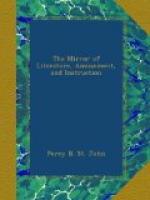In D’Israeli’s Curiosities of Literature, there is an amusing and instructive account of the Origin of Psalm-Singing. It appears that Psalms in verse were first written by that elegant French poet, Clement Marot, the favoured court bard of Francis I., who was termed by his un-envious brother poets, “the poet of princes.” They were published at Paris, and the volume contained fifty Psalms, written in various measures, and, which, from the beauty of their composition, (some specimens of which we have seen,) appear to be worthy of the muse of Marot. This “Holy Song Book,” as he entitled it, was “humbly dedicated to the powerful King of France,” and being considered by the volatile French people as an amusing novelty, it sold faster than any book of that period. In fact, the printers could not supply impressions fast enough for the demand; and, as the Psalms were considered in the light of ballads, they were set by the people to popular tunes, and were commonly sung as ballads.
This good reception of Marot’s Psalms induced the celebrated Theodore Beza to continue the collection; and another volume was printed, of which 20,000 were immediately sold: this was a considerable circulation, when we consider the few readers that then existed, in comparison with the number of readers in the present age. These had the advantage over Marot’s of being set to tunes of greater spirit. Beza, in his preface, says, that “these Psalms are admirably suited for the violin and other musical instruments;” and our readers will learn, not without surprise, that through the instrumentality of the gloomy Calvin, these compositions were set to most beautiful and simple airs. He wisely took advantage of popular feeling to spread his religious opinions, through the means of melody, and, in furtherance of this plan, he engaged the most celebrated composers of his time to furnish tunes to these Psalms. At first, the scheme was not discovered: for Catholics sang the Psalms as well as Hugonots; but, when Calvin appointed these Psalms, with their music, to be sung at his meetings, there was an end to the solace of the dreary hours of the poor Catholics. Marot himself was compelled to quit Geneva; Psalm-singing became an open declaration of Lutheranism; and “woe to the poor wight” who was caught in the diabolical act of singing these “pernicious Psalms.”
The history of Psalm-singing in our own island can be comprised in very few words. When the enthusiasm of the French in favour of their Psalms was at its height, one Sternhold, undertook to be our Marot, and wrote a Book of Psalms, which captivated the hearts of the Puritans, by whom they were practised at their chapels in the Protectorate of Cromwell, but were more particularly set and sung in the reign of Elizabeth. Psalms, about this time, were sung at City and Lord Mayors’ feasts, and turtle-eaters delighted to honour Psalm-singers. Soldiers used them as stimulants to exertion on their march, and even on parade; and there was scarcely a regiment but could boast of its Marot. About this time, too, it was customary for the inhabitants of houses which had windows facing the street, to regale the passenger with the “holy songs” of Sternhold.




